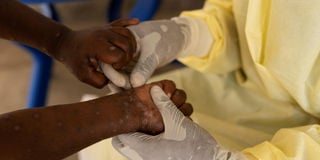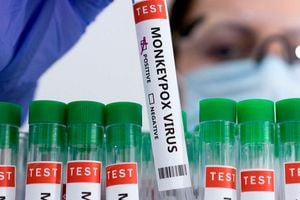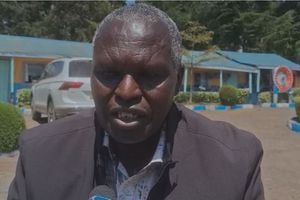Kenya intensifies Mpox screening with over 250,000 tested

A nurse takes a sample from a child declared a suspected case of Mpox - an infectious disease caused by the monkeypox virus that sparks off a painful rash, enlarged lymph nodes and fever.
What you need to know:
- Currently, the country has only recorded one case of disease. However, data from the Africa Centres for Disease Control and Prevention (Africa CDC) shows that in January 2022, there were 8,376 cases recorded in Africa. By 2023, the cases had risen to 14,957. However, between January and August 2024, the cases had spiked to 15,132. So far, a total of 1456 deaths have been recorded.
- This comes even as the World Health Organisation (WHO) declared the Mpox outbreak a public health emergency of international concern.
Over 250,000 Kenyans have been screened for Mpox following the confirmation of a case in the country two weeks ago.
The Ministry of Health said it has implemented a comprehensive screening at all ports of entry as part of a strategy to prevent the spread of the virus, ensuring that no traveler enters the country without being checked.
Principal Secretary of Public Health and Professional Standards, Ms Mary Muthoni, reported that, apart from the case reported on July 31, 2024, no additional cases have been detected so far adding that contact tracing is ongoing
“We have screened 250,000 travellers so far, with no suspected Mpox cases detected through these screenings. We have also activated all 26 public health emergency operations centres nationwide, prepared laboratories for Mpox testing, and deployed 120 trained personnel to manage any potential outbreak,” Ms Muthoni said.
As part of the response strategy, counties along the northern transport corridor have been categorized as high-risk, and operationalised public health emergency operations centres to coordinate response efforts.
“Our designated testing laboratory for now is the National Virology Reference Laboratory in Nairobi and Kenya Medical Research Institute in Kisumu,” said Dr Patrick Amoth, Kenya’s Director General for Health.
Commenting on the risk of Mpox surge in the country due to the burden of HIV, Dr Amoth expressed concern that HIV Patients who are not on antiretroviral, and those who are on treatment but have not achieved viral suppression could be at risk of developing severe Mpox disease.
Currently, the country has only recorded one case of disease. However, data from the Africa Centres for Disease Control and Prevention (Africa CDC) shows that in January 2022, there were 8,376 cases recorded in Africa. By 2023, the cases had risen to 14,957. However, between January and August 2024, the cases had spiked to 15,132. So far, a total of 1456 deaths have been recorded.
This comes even as the World Health Organisation (WHO) declared the Mpox outbreak a public health emergency of international concern.
The WHO announcement was made by its Director General, Dr Tedros Ghebreyesus, following consultation with its emergency committee after a deadlier strain of the virus, called clade 1b, had been reported in Kenya, Burundi, Uganda and Rwanda.
These countries have never reported any cases in history. Health experts also believe that the true situation of the disease may be far worse than has been reported, due to insufficient diagnostics and testing.
According to the International Health Regulations, a public health emergency of international concern (PHEIC) is ‘an extraordinary event which is determined to constitute a public health risk to other States through the international spread of disease and to require a coordinated international response potentially”.
This, explains WHO, ‘implies a serious, sudden, unusual or unexpected situation, carries implications for public health beyond the affected State’s national border, and may require immediate international action.’
“Today, the Emergency Committee on Mpox met and advised me that in its view, the situation constitutes a public health emergency of international concern. I have accepted that advice. WHO is on the ground, working with the affected countries, and others at risk, through our country and regional offices, as well as with partners, including Africa, NGOs, civil society and more,” said Dr Tedros.
“The emergence of a new clade of Mpox, its rapid spread in eastern DRC, and the reporting of cases in several neighbouring countries are very worrying. On top of outbreaks of other Mpox clades in DRC and other countries in Africa, it’s clear that a coordinated international response is needed to stop these outbreaks and save lives,” he added.
Dr Matshidiso Moeti, WHO Regional Director for Africa announced that WHO is collaborating closely with communities and governments, to reinforce measures to curb Mpox.
“With the growing spread of the virus, we’re scaling up further through coordinated international action to support countries bring the outbreaks to an end,” he said.
The declaration of Mpox as a global public health emergency is the second in two years. In July 2022, WHO announced the first, following a multi-country outbreak of Mpox, which was spreading swiftly through sexual contact, and in countries that had never recorded prior cases. In May 2023, the global health emergency was declared to be over, following a steady decline in global cases.
The WHO is appealing to donors for funds that will go into the Mpox response and requires immediate funding of about Sh1.95 billion (US$ 15 million) to support surveillance, preparedness and response activities. It has, however, already released Sh185 million (US$ 1.45 million) from its Contingency Fund for Emergencies to allow for an immediate scale-up.
About a week ago, WHO issued an urgent call for vaccine manufacturers to submit an Expression of Interest for Emergency Use Listing (EUL) of Mpox vaccines.
According to the Africa CDC, two vaccines are currently recommended for use against Mpox: JYNNEOS and ACAM2000. JYNNEOS is the preferred vaccine for the current outbreak of Mpox. It is a two-dose vaccine series, administered four weeks apart for maximum effectiveness. A vaccine recipient is considered fully vaccinated two weeks after receiving the second dose.
‘The JYNNEOS vaccine does not cause Mpox, smallpox, or any significant adverse reaction. Indications for the vaccine include known and presumed contacts of a case of Mpox and queer individuals who have had multiple sexual partners in the last 14 days." says Africa CDC.
"Vaccination is a known means of prevention against the disease. Africa CDC recommends post-exposure prophylaxis (PEP) with the approved vaccine for all close contacts of a confirmed case. Close contacts include those living in the same household or those who had sex with the case including kissing, hugging and cuddling, sharing of utensils, towels, and bedding, or coming in contact with or touching the rashes on the body of the case,” says Africa CDC.
It adds: “High-risk populations such as healthcare workers, immunocompromised individuals and sex workers should also be prioritised for vaccination as mass vaccination is not currently recommended for Mpox."
Preventing the spread of Mpox requires isolation of individuals diagnosed with Mpox from both humans and animals, infected individuals and those caring for them wearing appropriate personal protective equipment, including surgical masks and disposable gloves, to minimise the risk of transmission, and regular handwashing with soap and water, along with the proper disinfection of contaminated surfaces.





